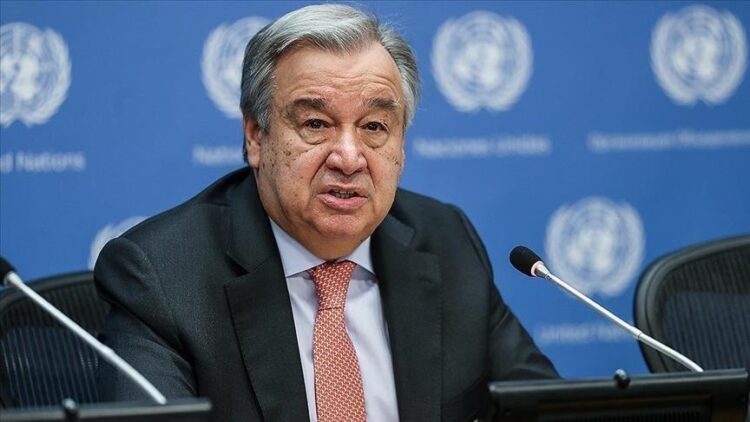On July 28, 2023, United Nations Secretary-General Antonio Guterres issued a strict and stern warning to the world and declared that the era of global warming has ended, and now we have entered an era of “global boiling.” This alarming statement comes as scientists confirm that July 2023 is on track to become the hottest month ever recorded in Indian History.
July’s scorching temperatures have been so extreme that scientists predict that this month will be the world’s warmest month globally on record. Several environmental organisations announced that the Earth’s temperature had surpassed the internationally accepted goal of limiting global warming to 1.5 degrees Celsius.
Views and Comments of Antonio Guterres
Guterres highlighted the need for swift political action to combat this crisis. “Humanity is in the hot seat,” he said “For vast parts of North America, Asia, Africa and Europe, it is a cruel summer and a disaster for the entire planet, and for scientists, it is unequivocal, and humans are to be blamed,” he said.
“Climate Change is here, It is terrifying, and it is just the beginning. He emphasised that while it is still possible to limit the global temperatures to 1.5 Degrees Celsius above pre-industrial levels and avoid the very worst of climate change, But only with dramatic and immediate climate action.”
“The Air is unbreathable, the heat is unbearable, and the level of fossil fuel profits and climate action is unacceptable. Leaders must lead. No more hesitancy, no more excuses, no more waiting for others to move first. There is simply more time for that.
Despite some progress, such as the robust renewable and positive steps from sectors like shipping, Guterres stressed that these efforts are not going far enough. “Accelerating temperatures demand accelerated action, he warmed, underscoring the importance and the urgency of the situation.
As the world grapples with the devastating effects of climate change, the call for immediate and drastic action has never been more critical.
Root Causes
The steady rise in global average temperatures, driven by pollution that traps sunlight and acts as a greenhouse around the earth, has made weather extremes worse.
Scientists believe that this year is hotter because El Nino, a natural pattern of wind and water that heats the planet, is returning three years later than its cooler counterpart, La Nina. That effect, along with greenhouse gas pollution, has led the World Meteorological Organisation (WMO) to predict that there is a two in three chance that one of the next five years will be 1.5C hotter than before that of the Industrial Revolution. The excessive use of fossil fuels is also increasing the temperature manifold.
According to a rapid analysis by the World Weather Attribution network on July 25, 2023, greenhouse gas pollution has driven up the temperatures of deadly heat waves on three continents this month. The results of the study showed that humans and humanity are the cause of heat waves, especially in Southern Europe, North America, and China.
The past three weeks have been the hottest since the records began, with global temperatures shattering previous records The World Meteorological Organisation, along with the Copernicus Earth program of the European Union, have attributed this extreme heat to be caused by the mass burning of fossil fuels. This has led to a violent weather pattern.
Views of other experts
Zeke Hausfather, who is a climate scientist at the US Non-profit organisation Berkeley Earth used tools from Japanese and European Meteorologists to estimate that the record would be broken and would be closer to 0.3 degrees Celsius.
Frederik Otto, a climate scientist at the Imperial College London and lead author of the study, said that we have to live with these and make it possible for people to live with these extreme conditions in summer, and these are not rare. He suggested that the burning of fossil fuels must stop as quickly as possible.
Joyce Kimutai, a climate scientist at the Grantham Institute, said bigger and stronger extreme weather events were causing havoc worldwide and particularly in poor countries least responsible for emissions.
Marina Romerello, a climate and health researcher at the University College of London and the head of the Lancet Countdown said: “We have data showing how the very foundations of health are being undermined by climate change, and despite that knowledge, governments are prioritising fossil fuels.
The president of the Cop28 Summit, Sultan Al Jabar, who is the head of the country’s national oil company, said that phasing down fossil fuels was inevitable and essential.
Catherine Abreu, the founder of the Canadian campaign group Destination Zero said that governments must understand that “this transition away from fossil fuels is not just inevitable, it is urgent, it needs to be planned, it requires cooperation and provision of finance at a scale that is currently not being provided.”
The WMO General Secretary Pettri Tallas said that “the need to reduce greenhouse gas emissions is more urgent than before. Climate action is not a luxury, but a must.”



















Comments